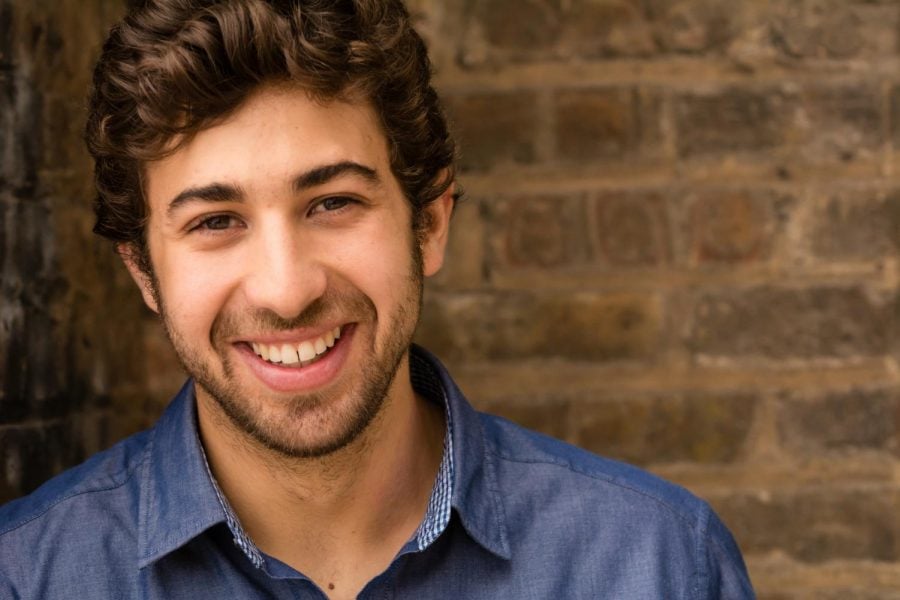Q&A: Northwestern alum Jed Feder talks role in TimeLine Production of “Oslo”
Jed Feder (Communication ‘11). Feder is starring as Uri Savir in the premiere Chicago Production of the Tony-Winning play “Oslo.”
September 16, 2019
In 1993, secret negotiations in Oslo, Norway, were held in an attempt to establish a solution to the ongoing Israeli-Palestinian conflict, ultimately resulting in the first face-to-face agreements between the two governments. Although the Oslo Accords failed to create lasting peace, they remain a symbol of a possible solution to the conflict.
“Oslo,” a Tony-winning play by J.T. Rogers, tracks the development of the Oslo Accords from the perspective of the Norwegian diplomats who organized the negotiations. The play is making its Chicago premiere this fall at the TimeLine Theatre, with a production directed by Nick Bowling opening September 18. Ahead of the opening, The Daily chatted with cast member and Northwestern alumnus Jed Feder (Communication ‘11), who plays Israeli politician Uri Savir, about the show’s portrayal of Israeli-Palestinian relations and his role in the show.
The conversation has been edited for brevity and clarity.
The Daily: What does “Oslo” reveal about the Israeli-Palestinian conflict? How does looking back at the Oslo Accords shed light on the modern day?
Feder: [“Oslo”] is about the hope that comes from being able to sit across from the person you don’t trust, don’t understand or don’t know, and see the humanity in them and try to work towards understanding them, which is how you work toward making peace with them. So it’s just very relevant, and I think it will play well today. The Accords were in many ways not 100% successful, but it was a big step toward Israel and Palestine acknowledging each other’s legitimacy for the first time. Peace is achieved slowly and over time. It’s a journey. It’s easy to look at the amount of conflict in the world and throw your hands up and say ‘It’s never going to get better.’ But a few individuals did take steps to make this better, and I think it’s everyone’s obligation to do what they can to try.
The Daily: How has the team of this production worked to deliver an authentic and respectful portrayal of the conflict?
Feder: There’s been a ton of attention spent. [The director] Nick’s brought on so many people to give the correct amount of history that is involved in this. We have three dedicated dramaturges, [advisers who research the historical and cultural background of a play,] a consultant on behalf of the Israeli perspective of the conflict and a consultant on behalf of the Palestinian perspective of the conflict. It’s a very real subject matter and very real events in this show. It’s very important to present it in an unbiased and sensitive way.
The Daily: “Oslo” is a three-act play where your character Uri appears at the beginning of the second act and quickly establishes himself as a dominating, combative force in the story. How is playing a part like that rewarding, and how is it challenging?
Feder: He sort of represents a major roadblock at first. This is true of the actual Oslo Accords — it was illegal for members of the Israeli government to be speaking to members of the PLO, so at first these two economic professors went to speak. When I enter, Israel is upgrading to actual representation in the process. So I get to let everyone else set up the tension, then come in and wreak havoc. It’s a very fun role to play. It has a lot of challenges too, because he lives in a lot of extremes. He can’t completely alienate himself from the story or the people watching because he’s not a villain of the show. He just comes in in this very strong way. It’s a challenge, figuring out how far to push that and still letting him be someone we can ultimately really get behind.
The Daily: How did your experiences at Northwestern prepare you for professional acting generally and this show specifically?
Feder: Northwestern is entirely what shaped my career and who I am. I didn’t take any acting classes at Northwestern, but I acted in a bunch of shows, especially the mainstage shows which are directed by faculty. I learned so much about the technique of [acting], and how to do it in a professional setting.
The Daily: As a Jewish person, how did your cultural background inform your performance?
Feder: There’s a lot of people involved in the show whose personal backgrounds have some sort of connection to this conflict. It’s always a discussion about authenticity in casting, when it’s important and when it’s not. I have appreciated how this is both professional to me and personal to me. It feels like a responsibility and also a gift to get to present someone who was a part of trying to create peace in a place I feel a cultural and personal connection to.
Email: [email protected]
Twitter: @wilsonchapman6


